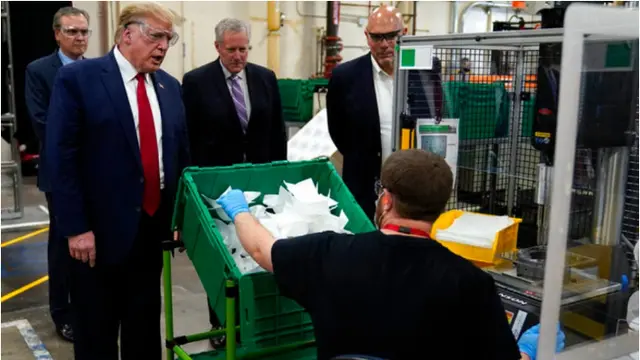Editor's Note : The following article is taken from the Chinese-language opinion column "The Real Point".
Mayor Michael Melham of Belleville, New Jersey has issued a statement saying he believes that he contracted COVID-19 in November after he was found to have antibodies last week. If proven to be scientifically valid, his statement would dramatically bring forward the date of the first confirmed case in the U.S. by two months. It would also falsify claims made by politicians in Washington that the Trump administration has been transparent about the pandemic situation in the country.
The U.S. government has been widely criticized for being unusually passive in collecting, sorting and releasing information related to the country's COVID-19 spread, even though both the number of infections and the death toll are the highest in the world. It has not only violated the American people's right to know, but also caused delays in the nation's response to the pandemic.
Washington has avoided analysis of the timeline tracking the U.S. outbreaks, including its first case. Before Mayor Melham issued his press release, Robert Redfield, Director of the Centers for Disease Control and Prevention, admitted that some deaths during the country's current flu season, which began in September, may have been incorrectly attributed to influenza.
A postmortem testing found that a death on February 6 in California was related to COVID-19 and the victim did not have any travel history. The fatality occurred three weeks before a case on February 28, which was declared by the CDC as the first U.S. death from the virus.
These cases lead to questions about why the CDC did not confirm the cause of the February 6 death in California until two months later, as well as how many "flu patients" may have been misdiagnosed and whether the community spread of COVID-19 already occurred in the States in September.
The United States was ambiguous in disclosing basic information, such as confirmed cases and deaths, and even initiated administrative review and punished prevention and control experts.
As early as January, Dr. Helen Chu had issued a warning about the possibility of a domestic outbreak in the U.S. and reported the test results to state regulators in February. However, her team were ordered to stop testing. In late February, the White House required U.S. officials, health departments and experts to obtain approval from Vice President Mike Pence's office before making public statements about the pandemic.
On March 2, the CDC stopped publishing data related to the number of people tested and the number of deaths on the grounds of so-called "data inaccuracy". Moreover, USS Theodore Roosevelt commander Captain Brett Crozier was fired in April for showing "extremely poor judgment" after writing a letter begging for help following the COVID-19 outbreak on board the aircraft carrier under his command.
As for Dr. Anthony Fauci, the United States' top medical expert on the coronavirus pandemic and a member of President Donald Trump's coronavirus task force, he cautioned the president against talk of quickly reopening businesses. He also rebuffed White House economic adviser Peter Navarro's assertion on the efficacy of hydroxychloroquine and criticized the failure of the United States to meet the requirements for virus testing.
President Trump even once retweeted a threat to fire Fauci after the immunologist said the country's slow response to COVID-19 had cost lives, likely contributing to further threats to his personal safety. The White House has also blocked the American physician from testifying to Congress about the government's response to the pandemic.
Details of Project Airbridge, which was supposed to speed the delivery of much-needed medical equipment, are described as being secret in a report carried by Bloomberg News. Senator Elizabeth Warren of Massachusetts requested data to be made public, saying that no state could get the equipment and that no one could explain how Project Airbridge had worked.
Information shared by the U.S. about its procurement and distribution of medical equipment was ridiculed by the media, who compared it to that of a Third World country. Christi Grimm, the acting inspector general for the Department of Health and Human Services, was removed from her post after releasing a report that found severe shortages of tests and critical protective gear in several hundred hospitals across the country. Trump asserted that the report was "politically biased".
Politicians in Washington have repeatedly concealed the reality of the pandemic in the country to cover up their ineffective governance and incompetence, but is the U.S. administration trying to hide more? For a superpower that leads the world in healthcare and technology, the unchecked spread of the virus, high fatality rate and subterfuge certainly do raise questions.
(CGTN)
 简体中文
简体中文

